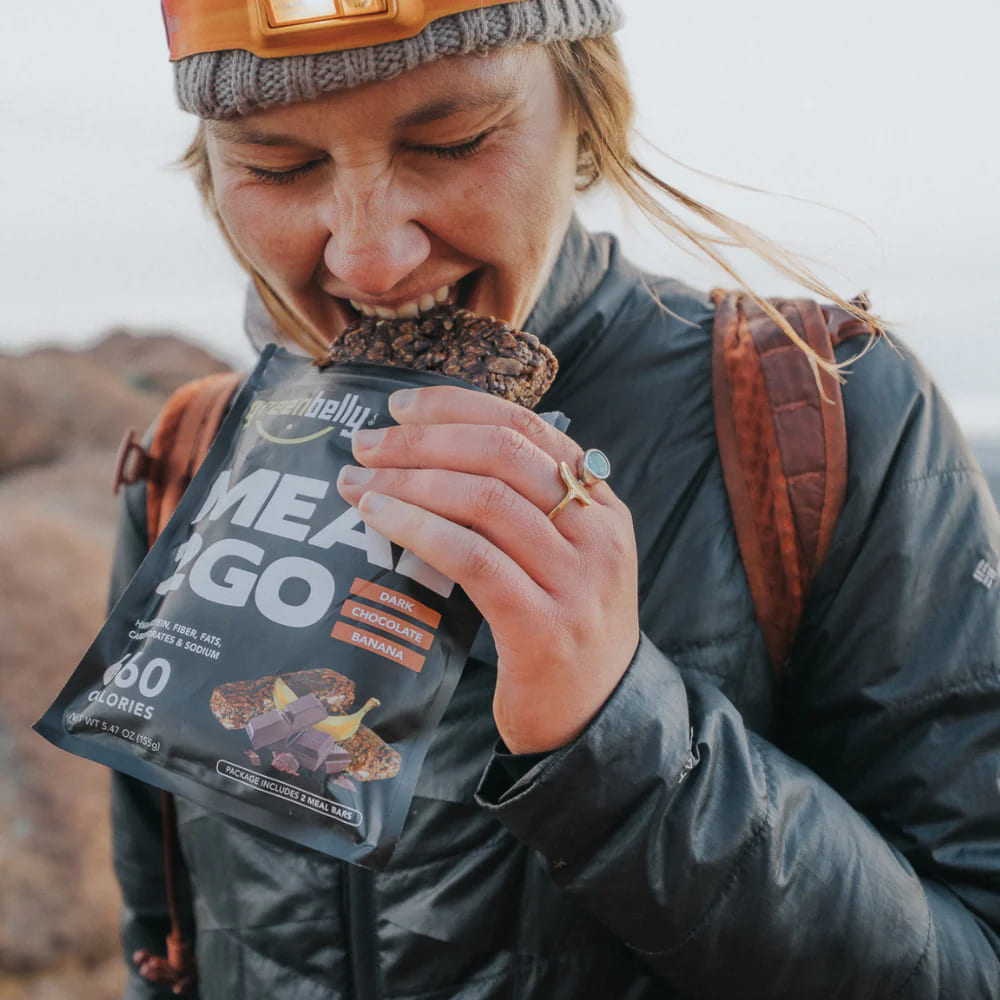We tested the best dehydrated vegetable brands available today according to price, nutrition, and rehydration/cooking time. Read on to see how they performed, which is best for you, and get some valuable buying and use advice.
Table of Contents
Best Dehydrated Vegetable Brands
The best dehydrated vegetable brands are:
- Best Overall Dehydrated Vegetable Brand: RAINY DAY FOODS
- Best Budget Dehydrated Vegetable Brand: HONEYVILLE
- Dehydrated Vegetable Brand with Cleanest Ingredients: HARMONY HOUSE
- Dehydrated Vegetable Brand with Longest Shelf Life: AUGASON FARMS
- Best Dehydrated Vegetable Powder Brand: NESTED NATURALS
- Best Dehydrated Vegetable Meal Brand: GOOD TO-GO
The product comparison table below is sortable. Click the arrow in the heading cell to sort the models by preferred spec.
| MODEL | PRICE RANGE |
WEIGHT RANGE |
REHYDRATION TIME |
SHELF LIFE |
TYPE | SCORE |
|---|---|---|---|---|---|---|
| 1. Rainy Day Foods | $12.19 - $309.69 | 6 oz - 50 lbs | 5 - 15 min | 25 years | Vegetable | 9/10 |
| 2. Honeyville | $11.99 - $98.99 | 1.50 lbs - 40 lbs | 1 - 20 min | 1 - 15 years | Vegetable | 9/10 |
| 3. Nested Naturals | $31.95 - $59.95 | 6.5 oz | NA | 2 years | Powder | 9/10 |
| 4. Augason Foods | $8.99 - $184.99 | 14.6 oz - 12 lbs | 3 - 30 min | 25 years | Vegetable | 9/10 |
| 5. Wise Foods Company | $174.99 | 2 lbs | 10 - 15 min | 25 years | Vegetable | 9/10 |
| 6. Harmony House | $3.95 - $699.95 | 0.5 oz - 50 lbs | 10 - 30 min | 1 - 2 years | Vegetable | 8/10 |
| 7. Good to-Go | $6.85 - $88.95 | 3.4 oz - 6.6 oz | 20 min | 5 years | Meal | 8/10 |
| 8. Amazing Grass | $28.99 - $99.99 | 8.5 oz - 1.76 lbs | NA | 2 years | Powder | 8/10 |
| 9. Mother Earth Products | $6.45 - $128.50 | 2 oz - 25 lbs | 10 - 30 min | 2 years | Vegetable | 8/10 |
| 10. Northbay Trading | $5.32 - $3,181.29 | 8 oz - 1,050 lbs | 10 - 20 min | 1.5 years | Vegetable | 8/10 |
| 11. Outdoor Herbivore | $8.99 - $18.99 | 5.4 oz - 10.6 oz | 10 min | 1 - 2 years | Meal | 7/10 |
| 12. Backpacker's Pantry | $4.99 - $99.99 | 2.1 oz - 6.2 oz | 15 - 20 min | 3 years | Meal | 7/10 |
Best Overall Dehydrated Vegetable Brand
Rainy Day Foods
Price: $12.19-$309.69
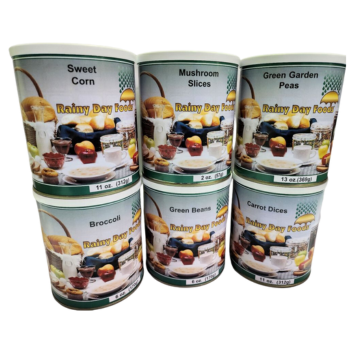
✅ Affordable
✅ Long shelf life
✅ Can buy in small to large quantities
❌ No major cons
KEY SPECS
- Weight Range: 6 oz-50 lbs
- Rehydration Time: 5-15 minutes
- Shelf Life: 25 years
- Type: Vegetable
- Minimally Processed?: Y
- Artificial Sweeteners?: N
- Preservatives?: N
- Added Salt?: N
Rainy Day Foods is our pick for the best overall dehydrated food brand. We like that they offer a wide range of dehydrated and freeze-dried vegetables at some of the lowest prices of the brands we tested. One thing that sets Rainy Day apart for us is the ability to buy in smaller portion sizes. Many other brands we tested only sell in large prepper buckets.
We like the long, 25-year shelf life. Most of their vegetables will cook in under 15 minutes, some of the shortest we tested. Our favorite product is the Beginner Vegetable Kit which contains broccoli, corrections, corn, peas, green beans, and mushrooms.
Best Budget Dehydrated Vegetable Brand
Honeyville
Price: $11.99-$98.99
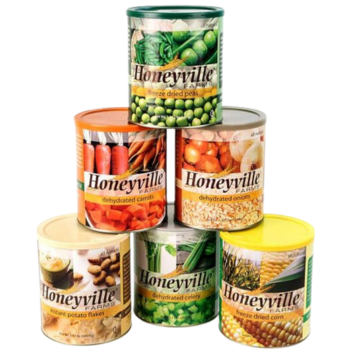
✅ Best budget brand
✅ Fast cooking time
❌ Only available in bulk
KEY SPECS
- Weight Range: 1.50 lbs-40 lbs
- Rehydration Time: 1-20 minutes
- Shelf Life: 1-15 years
- Type: Vegetable
- Minimally Processed?: Y
- Artificial Sweeteners?: N
- Preservatives?: N
- Added Salt?: N
Honeyville offers mostly freeze-dried vegetables in #10 cans. Because most of their veggies are freeze-dried on average, they cook up fast and can even be cold-soaked. We like their combo kit that features their most popular vegetables (peas, carrots, onions, celery, corn, and potato flakes).
A disadvantage for us is that they are only offered in bulk sizes. Great for thru-hikers, but it might take a while for the casual backpacker to go through the food. While the labels don’t scream quality, the price is right for the budget minded. Honeyville is our favorite budget dehydrated vegetable brand.
Best Dehydrated Vegetable Powder Brand
Nested Naturals
Price: $31.95-$59.95

✅ Organic & clean ingredients
✅ No rehydration time
❌ Expensive per serving
KEY SPECS
- Weight Range: 6.5 oz
- Rehydration Time: Not Applicable
- Shelf Life: 2 years
- Type: Powder
- Minimally Processed?: Y
- Artificial Sweeteners?: N
- Preservatives?: N
- Added Salt?: N
Nested Naturals is a dehydrated vegetable supplement brand that focuses on making powdered drinks. We like that these powdered drinks require no cooking time. Simply mix with water and drink. They focus on creating supplemental drinks-not meal replacements.
We recommend these if you want a dose of vitamins and minerals on the trail, but don’t expect them to replace a full meal. We like the clean ingredient list that is all organic, vegan, and gluten-free. At over $1 per serving, they do cost more than buying plain dehydrated vegetables.
Dehydrated Vegetable Brand with Longest Shelf Life
Augason Farms
Price: $8.99-$184.99

✅ Long shelf life
❌ Only offered in bulk
KEY SPECS
- Weight Range: 14.6 oz-12 lbs
- Rehydration Time: 3-30 minutes
- Shelf Life: 25 years
- Type: Vegetable
- Minimally Processed?: Y
- Artificial Sweeteners?: N
- Preservatives?: N
- Added Salt?: N
Augason Foods focuses on emergency preparedness and sells its vegetables in bulk containers. If you’re buying bulk to make meals for a thru-hike, they are also a great option for backpackers. We like the wide range of veggies and fruits. They don’t use additives or preservatives either, which we like.
Our favorites are the freeze-dried peas and strawberries, which you can eat right out of the can. Because they are focused on emergency prep, they come with a 25-year shelf life, one of the longest brands we tested.
Dehydrated Vegetable Brand with Cleanest Ingredients
Harmony House
Price: $3.95-$699.95
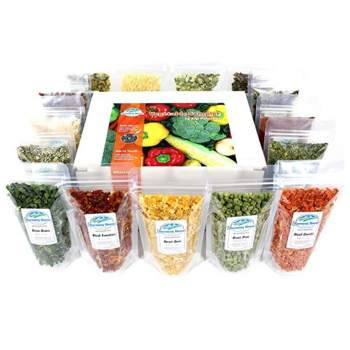
✅ Affordable
✅ Clean ingredients
❌ Longer rehydration time
❌ Shorter shelf life
KEY SPECS
- Weight Range: 0.5 oz-50 lbs
- Rehydration Time: 10-30 minutes
- Shelf Life: 1-2 years
- Type: Vegetable
- Minimally Processed?: Y
- Artificial Sweeteners?: N
- Preservatives?: N
- Added Salt?: N
If you're looking for dehydrated vegetables with a consistently clean ingredient list, Harmony House is our top choice. They use non-GMO vegetables and leave out additives and preservatives. They have a huge product list of dehydrated and freeze-dried vegetables too.
We like the wide range of sizes that the food comes in. You can get a small portion, good for a few meals, or buy in bulk for your next thru-hike. Check out the backpacking kit that provides 45 cups of food in a 3-pound package. The kit includes a range of veggies and beans. The rehydration time is longer than other brands, and we wish the shelf life was a little longer than the 1-2 years on the label.
Best Dehydrated Vegetable Meal Brand
Good To-Go
Price: $6.85-$88.95
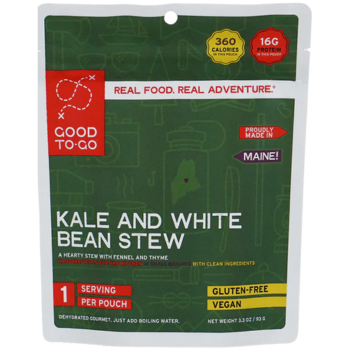
✅ Long shelf life
✅ Most affordable meal option
❌ Longer cooking time
❌ Contain preservatives
KEY SPECS
- Weight Range: 3.4 oz-6.6 oz
- Rehydration Time: 20 minutes
- Shelf Life: 5 years
- Type: Meal
- Minimally Processed?: Y
- Artificial Sweeteners?: N
- Preservatives?: Y
- Added Salt?: Y
Good To-Go meals are focused on creating quality vegetable meals. We found them to be the most affordable meal brand that we tested. We like that they have a long shelf life too. 5 years is the longest of any meal brand on our list. They are easy to cook up but can take a while, 20 minutes in most cases. This is longer than other meal brands we looked at.
We recommend soaking them before you cook them to save fuel. They do contain preservatives, which is less than desirable for us. But if you’re after a convenient meal versus creating your own, they are one of our top options.
The Other Noteworthy Models
Wise Foods
Price: $174.99
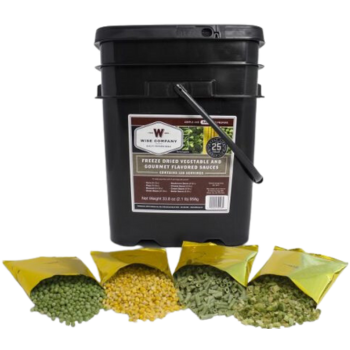
✅ Shorter rehydration time
✅ Long shelf life
❌ Expensive per serving
KEY SPECS
- Weight Range: 2 lbs
- Rehydration Time: 10-15 minutes
- Shelf Life: 25 years
- Type: Vegetable
- Minimally Processed?: Y
- Artificial Sweeteners?: N
- Preservatives?: N
- Added Salt?: N
Wise is another emergency prep food brand. They focus on selling freeze-dried vegetable kits in large serving sizes. The bucket we tested has 120 servings with a mix of different vegetables. The downside is you don’t get to choose your vegetables. If you have specific recipes, you are trying to make it better to go with a brand that sells by the ingredient.
At $175 per 120-serving bucket, Wise Foods is also the most expensive brand we tested. But if you’re looking for an easy, one-click option to buy a bucket of veggies, Wise Foods is a good pick.
Amazing Grass
Price: $28.99-$99.99
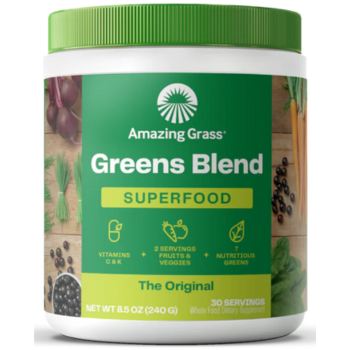
✅ Clean ingredients
✅ No rehydration time
❌ Expensive per serving
KEY SPECS
- Weight Range: 8.5 oz-1.76 lbs
- Rehydration Time: Not Applicable
- Shelf Life: 2 years
- Type: Powder
- Minimally Processed?: Y
- Artificial Sweeteners?: N
- Preservatives?: N
- Added Salt?: N
Amazing Grass is another dehydrated vegetable supplement brand. They focus on powdered drinks like Nested Naturals, but they also have a range of vegetable power mixes that can be added to foods for a nutrition boost. We like the ingredient list, which is clean although not 100% organic.
Another perk for us is that it requires no cooking or rehydration time. Simply add water and drink or sprinkle in your food. Amazing Grass is the most expensive vegetable power brand we tested, costing over $1 per serving. They sell in bulk, which can ease the pain on your wallet.
Mother Earth Products
Price: $6.45-$128.50
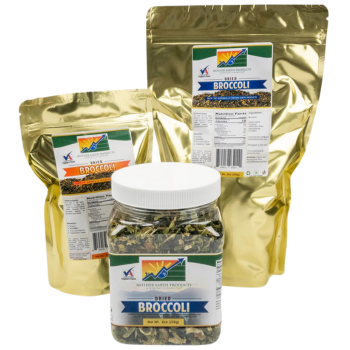
✅ Clean ingredients
✅ Affordable
❌ Longer cooking time
KEY SPECS
- Weight Range: 2 oz-25 lbs
- Rehydration Time: 10-30 minutes
- Shelf Life: 2 years
- Type: Vegetable
- Minimally Processed?: Y
- Artificial Sweeteners?: N
- Preservatives?: N
- Added Salt?: N
Like Harmony House, Mother Earth Products produces non-GMO, preservative-free freeze-dried, and dehydrated foods. We love the wide range of vegetables, fruit, beans, and TVP (textured-vegetable protein). They come in pouches, plastic jars, or bulk bags. Some weigh up to 25 lbs+! On average, we found they run a little more expensive than Harmony House, but still are an affordable option for the quality ingredients.
Most products feature a 2-year shelf life, which isn’t long compared to others, but should be adequate for most backpackers. The cooking time is on the longer side. We recommend soaking before you cook to save on fuel. Mother Earth also has a line of vitamins and beauty products.
Northbay Trading
Price: $5.32-$3,181.29
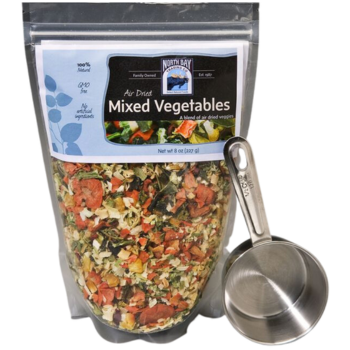
✅ Affordable
✅ Smaller portions available
❌ Shorter shelf-life
KEY SPECS
- Weight Range: 8 oz-1,050 lbs
- Rehydration Time: 10-20 minutes
- Shelf Life: 1.5 years
- Type: Vegetable
- Minimally Processed?: Y
- Artificial Sweeteners?: N
- Preservatives?: N
- Added Salt?: N
NorthBay Trading focuses on dehydrated vegetables and powders. They don’t offer freeze-dried options. We like that each veggie is available in individual bags (8 to 10 ounces), giving you the option to dry before committing to their bulk sizes.
One of our favorites is the air-dried jalapenos. Easy to add to just about any meal to spice it up. The veggie soup mix cooks up nice for fall or winter camping. No sulfites are used, and all veggies are certified kosher. Our biggest drawback is the shorter shelf-life of 1 to 2 years. But in most cases, that should be long enough.
Outdoor Herbivore
Price: $8.99-$18.99
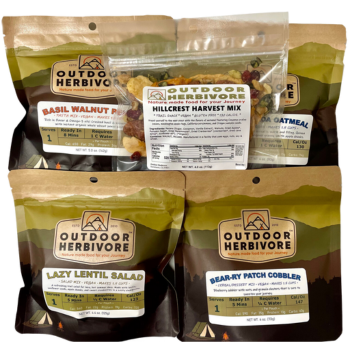
✅ Quick rehydration time
✅ Cleanest ingredient list for meals
❌ Expensive
❌ Shorter shelf life
KEY SPECS
- Weight Range: 5.4 oz-10.6 oz
- Rehydration Time: 10 minutes
- Shelf Life: 1-2 years
- Type: Meal
- Minimally Processed?: Y
- Artificial Sweeteners?: N
- Preservatives?: Y
- Added Salt?: Y
Another dehydrated vegetable meal brand, Outdoor Herbivore, focuses on creating meals with clean ingredients. We found them the cleanest of the other meal brands we tested. However, we should note they still use preservatives and add salt. One of our favorite things about Outdoor Herbivore is the focus on making a line of veggie meals designed for cold soaking.
Even the meals they make for cooking use only freeze-dried vegetables and cook up in under 10 minutes, the fastest meal brands on our list. We don’t like that they are more expensive, but at least you’re paying for quality. The shelf life of 1 to 2 years is lower than we’d like.
Backpacker's Pantry
Price: $4.99-$99.99
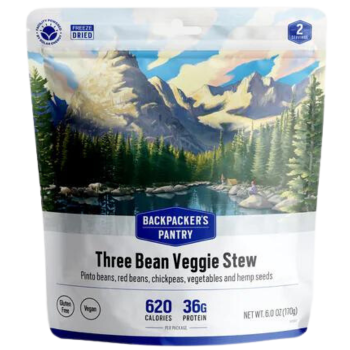
✅ Widely available
✅ Wide range of meals
❌ Expensive
❌ Subpar ingredient list
KEY SPECS
- Weight Range: 2.1 oz-6.2 oz
- Rehydration Time: 15-20 minutes
- Shelf Life: 3 years
- Type: Meal
- Minimally Processed?: N
- Artificial Sweeteners?: N
- Preservatives?: Y
- Added Salt?: Y
Backpacker’s Pantry is a dehydrated vegetable meal brand found most anywhere, from REI to Walmart. We like that they have a wide range of meal options to keep your taste buds entertained. However, we found them expensive, similar to Outdoor Herbivore, but with a much less desirable ingredient list. We don’t like that these meals are packed with salt and preservatives. But these are a solid choice if you need a last-minute meal or have limited resupply options.
Key Factors To Consider When Choosing
Price
Price comes down to the quality of the ingredients used and the method used to dehydrate the vegetables. High-quality, organic vegetables will cost the most. Freeze-drying uses more power and requires specialized facilities adding to the cost. Drying your own vegetables at home is often the cheapest and can be a fun activity.
Dehydrated vegetable brands that provide the greatest value:
Most Affordable dehydrated vegetable brands:
Premium dehydrated vegetable brands (most expensive):
Nutrition and Ingredients
Look for the brands that use the best quality vegetables to preserve. This will ensure they are staying with the cleanest product. Freeze-drying doesn’t use heat and will lock in more vitamins and minerals than dehydrating. Most dehydrated vegetables don’t require additional ingredients like salt or preservatives, but be sure to check the labels to ensure they haven’t been added.
The best-dehydrated vegetable brands for minimally processed ingredients:
Rehydrating / Cooking Time
Food that cooks faster on the trail will not only let you eat sooner but will also save you fuel too. Freeze-dried vegetables will rehydrate the fastest and often don’t even need cooking. They are the best choice for cold soaking. Dehydrated vegetables will be tough and chewy without a little bit of heat or a much longer soaking time. Powdered vegetables don’t require any cooking or rehydration time.
Dehydrated vegetable brands that rehydrate the fastest:
Other Things to Consider
Shelf Life
Dehydrating vegetables has been a method to extend the life of vegetables for centuries. Shelf life varies; home-dehydrated vegetables generally last 6-12 months. Commercial options will be good for 2-3 years. Freeze-dried vegetables will last the longest, up to 25 years. The longer the shelf life, the easier it is to buy in bulk and save money. Just make sure extra preservatives aren’t added, which can be harmful to your health.
Weight
The weight of a dried vegetable depends on the type of vegetable and the process by which it is dried. Freeze-dried vegetables remove the most water, making them the lightest possible. Dehydrated vegetables have slightly more water in them and therefore weigh slightly more. Most powdered vegetables are first made by freeze-drying and weigh a similar amount per serving. If you’re looking for the lightest vegetables possible, pick veggies like freeze-dried peas or potatoes.
Type: Dehydrated, Freeze-Dried, Powdered, or Meals?
Dried vegetables are available in several forms based on how they were preserved. There are dehydrated, freeze-dried, and powdered vegetables. Each one has advantages and disadvantages.
DEHYDRATED VEGETABLES
Dehydrated vegetables are placed in a dehydrator that circulates heated air to remove the water content of the vegetables. Because it uses heat, veggies tend to lose some of their vitamins in the process. They also shrink in size and harden during dehydration. This process costs less than freeze-drying, making it more common than other dried options. It also can be done at home with a countertop dehydrator. These vegetables rehydrate by cooking or soaking in water, but they take time.
FREEZE-DRIED VEGETABLES
Freeze-dried vegetables use a refrigerated vacuum to pull the moisture out of the vegetables. This process minimizes the loss of vitamins and minerals. It also keeps the shape, size, and texture of the vegetables intact, giving them the closest texture to raw vegetables. Because they maintain more of their size, freeze-dried vegetables are not as packable as their dehydrated counterparts.
They can be eaten directly as a snack or hydrated and added to a hot meal. They pop back to life quickly, making them perfect for a hungry hiker and great for hikers who cold-soak.

From left to right: dehydrated vegetables, freeze dried and powdered.
POWDERED VEGETABLES
Powered vegetables are dried vegetables that have been ground up into a fine powder. They are a great alternative for folks who want the nutrient boost of vegetables without the fuss of having to pack and prepare them. Sprinkle the powder over your meals or add them to a smoothie. The powders store easily in a Ziploc bag, making them easy to pack.
Powdered vegetables provide a variety of vitamins and minerals, but you lose out on the dietary fiber you'd get from fresh vegetables. Not having fiber makes them easier to digest, though.
VEGETABLE MEALS
If you are looking for more than just plain dried vegetables, you should check out brands like Good To-Go, Outdoor Herbivore, and Backpacker's Pantry.
Good to Go offers bold and unique flavors in their vegetable-based meals. The Indian Vegetable Korma and Mexican Quinoa bowl are recommended. Outdoor Herbivore makes great high-quality, one-pot meals as well - cold and hot water options. Backpacker's Pantry is known for its add-hot-water meals, but it also makes a freeze-dried vegetable medley that includes Corn, Peas, and Carrots in a light butter-flavored sauce.
*Note: When shopping for dehydrated vegetables, check the nutritional label to see if sulfites or similar preservatives were used in the processing. These chemicals help extend the shelf life of dehydrated foods, but they may be unwanted additions for folks trying to avoid preservatives for health reasons.
Popular Dehydrated Vegetables
You can get a variety of vegetables in a dehydrated form. Not all veggies are sold whole. Some dark green leafy vegetables like spinach are sold as flakes because they break easily when dehydrated. Our favorites include potato flakes because they hydrate readily and are packed full of carbs.
Carrots and green beans also rehydrate well and add color and flavor to a meal. Broccoli is another excellent choice because it is packed full of nutrition and doesn't require long cooking to rehydrate. Some of the most popular dehydrated vegetables are:
- Corn
- Peas
- Beets
- Asparagus
- Potatoes
- Broccoli
- Spinach
- Carrots
- Red Pepper
- Celery
- Onions
- Tomatoes
 CC BY-SA 3.0 | Wikipedia (Vassilik)
CC BY-SA 3.0 | Wikipedia (Vassilik)
Why Dried Vegetables?
We've talked about how to carry fresh fruits and vegetables on the trail, but it is challenging. Veggies are heavy to lug around and can spoil or bruise relatively quickly - not a great combination for a hiker's rugged and remote lifestyle. Before you limit yourself to meat and grains, though, you should experiment with a few bags of dehydrated vegetables and see how they work in your food plan.
We’ve outlined only some of the benefits you may discover when you start packing a stash of dehydrated vegetables.
NUTRITIOUS: Dehydrated vegetables are packed full of vitamins and minerals that your body needs, especially when it is depleted from long days of hiking.
*Tip: The most common question about dehydrated vegetables is whether they are as nutritious as their fresh counterparts. And the answer is (mostly) a 'yes.'
Fresh is definitely best, but dried veggies lose very little of their nutritional value when they go through dehydration. They retain most of the minerals, most of the vitamin A, and some of the B vitamins. What they lose are volatile nutrients like Vitamin C and beta-carotene.
You can, however, minimize this loss by dehydrating at lower temperatures or pre-treating the food with chemicals like sulfur dioxide. You can also add some vitamin C by dipping the food in citrus juice or citric acid.
PACKABLE: They are lightweight and take up a fraction of the size of their fresh counterparts. You can place them at the bottom of your food bag and not worry about them rotting or bruising while you walk.
EASY PREP: Dehydrated vegetables are convenient for backpacking, similar to other dried foods. They are ready to eat, so you don't have to spend time cutting or chopping them. Just pull them out of the bag and drop them in your food. You also don't have to worry about spoilage even when you are on a long stretch between resupplies.
INEXPENSIVE: Contrary to popular belief, there are plenty of low-price, quality vegetable blends. Pricing varies between manufacturers, but you should expect to pay about $1 an ounce for smaller 10-ounce packages and less if you buy in bulk. Each ounce yields between 1/4 and 1/2 cups of dehydrated vegetables. Potatoes tend to be the most affordable dehydrated vegetable, while asparagus, mushrooms, and sweet potatoes are more expensive.
*Tip: Buy more than one serving at a time and get a hearty serving for only $1 to $2, like this quart-size jar for $20.
Worried about not eating them? Well, some options, like those from Augason Foods, will last up to a year. Unopened bags don’t spoil (25-year shelf life), so they ship well in drop boxes. As long as you keep them in a sealed Ziploc, dehydrated vegetables will last one to three weeks after opening.
How To Cook Dried Vegetables
Cooking dehydrated vegetables is simple and just the same as cooking any other dehydrated food. You just need to:
- Add hot water. It depends on the specific vegetables you are cooking. However, as a general rule of thumb, you should add 1 part vegetable to 2 parts water.
- Wait. Let simmer for 10-15 minutes.
You can drain the water when done, eat it plain, add it to a soup, or mix them into your noodles, rice, or whatever. You also can use the freezer bag method of cooking. However, you'll want to choose veggies like carrots or broccoli that cook quickly with this method.
Don't have a stove? Not a problem; you can rehydrate dried vegetables by cold soaking them for a few hours while you hike. You also can eat them without cooking. Just chew them slowly so they will rehydrate in your mouth.






 650-Calorie Fuel
650-Calorie Fuel